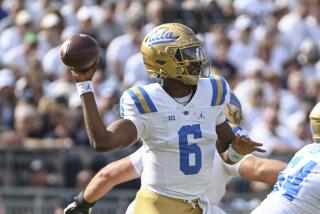Making the Right Turn at a Crossroads
- Share via
On a gorgeous autumn Saturday at the Rose Bowl, far from the madding crowd of college football’s elite, Coach Karl Dorrell and his UCLA Bruins made a quiet move back toward respectability.
When they beat Stanford -- shut out the pass-happy Cardinal, no less -- it was a result worthy on a national scale of one of those steady crawls across the bottom of your TV screen while Stuart Scott or Chris Berman jabbers on about the powerhouses. UCLA and Stanford have no Rose, Orange, Fiesta or Sugar in their future, or even Citrus. The postseason sugar plums in their vision are the Sun, Insight or Las Vegas bowls, plums only for those who feel better when the end of the regular season isn’t really the end for them.
But the significance for the Bruins of this 21-0 victory should not be lost on college football fans, nor the 54,021 who turned out to watch in person. Yes, it was just one game, but had the result been the opposite, had UCLA slipped to 4-4 overall and 2-3 in the Pacific 10 Conference, the Bruin natives would have been restless. And with reason.
Whether or not even he is willing to admit it, this was a crossroads game for Dorrell and UCLA.
Dorrell, who won’t turn 41 for six weeks and who came to this job last season with no prior head-coaching experience, was a questionable choice from the start. He had been a star wide receiver for UCLA, which was a help. But when the people who write your school’s media guide have to highlight their head coach’s prior success with a box that features a 5-2 record in bowls -- as an assistant coach -- eyebrows raise.
This is, after all, UCLA, with all the history and lore that comes with Gary Beban and Terry Donahue and Red Sanders and so many more.
And with the predictable first season of enthusiastic starts and clueless finishes -- the Bruins won six of their first eight and still finished 6-7 -- the patience starts wearing thin and season No. 2 becomes the litmus test for fan happiness, not to mention ticket sales and media commentary.
Season No. 2 is now with us.
Had UCLA won Saturday and been facing a remaining three games on its schedule against the likes of Cal, Arizona State and USC, the crystal ball wouldn’t quite read the same. But the Bruins have Washington State at home, Oregon at Eugene and then the inevitable USC game after a two-week rest. That translates to a possible 7-4 finish, and wouldn’t the Sun Bowl be proud. Washington State should be beatable, possibly crush-able after SC got done with the Cougars. And Oregon is good, but not one of those Mike Bellotti juggernauts of recent years.
The finale against USC, of course, is a different story. Barring a drastic reversal of form, the Bruins couldn’t win that game with machetes. But nobody is going to come down hard on Dorrell for that, at least not this year. USC and Pete Carroll are currently from another planet, and all the Bruin faithful is looking for at this stage of the Dorrell era is progress, the hint of better days and the hope of good things to come.
All that was there Saturday.
The shutout was the first by a Bruin team since 1996, and that was against Northeast Louisiana. You had to go back to 1987 in Palo Alto for the last Bruin Pac-10 shutout, when Stanford was a 49-0 victim. But this was a decent Cardinal team, a team that gave USC a real game at 31-28 and came in Saturday at 4-3.
Plus, the shutout was accomplished by a Bruin defense that wasted an 11-point lead against Arizona State last week and got walked all over for 48 points. It was a defense led by a junior linebacker named Spencer Havner, who is a third-year starter and who spent the entire afternoon around the ball. He had 16 tackles, a key interception and represented perhaps the first return to any sort of UCLA defensive dominance since it all went away that fateful December day in 1998, when the Bruin defense made Miami’s Edgerrin James into Jim Thorpe.
“Yes, we were thinking shutout,” said Havner. “Not at first, but after the first couple of series, there was a buzz on the bench.”
Dorrell, either painfully shy or terminally bland, uncharacteristically tried for a little buzz of his own in his news conference.
“Was that a great victory or what?” he began.
The answer was obvious. For his team, his school and his job, yes, it was.
More to Read
Go beyond the scoreboard
Get the latest on L.A.'s teams in the daily Sports Report newsletter.
You may occasionally receive promotional content from the Los Angeles Times.







